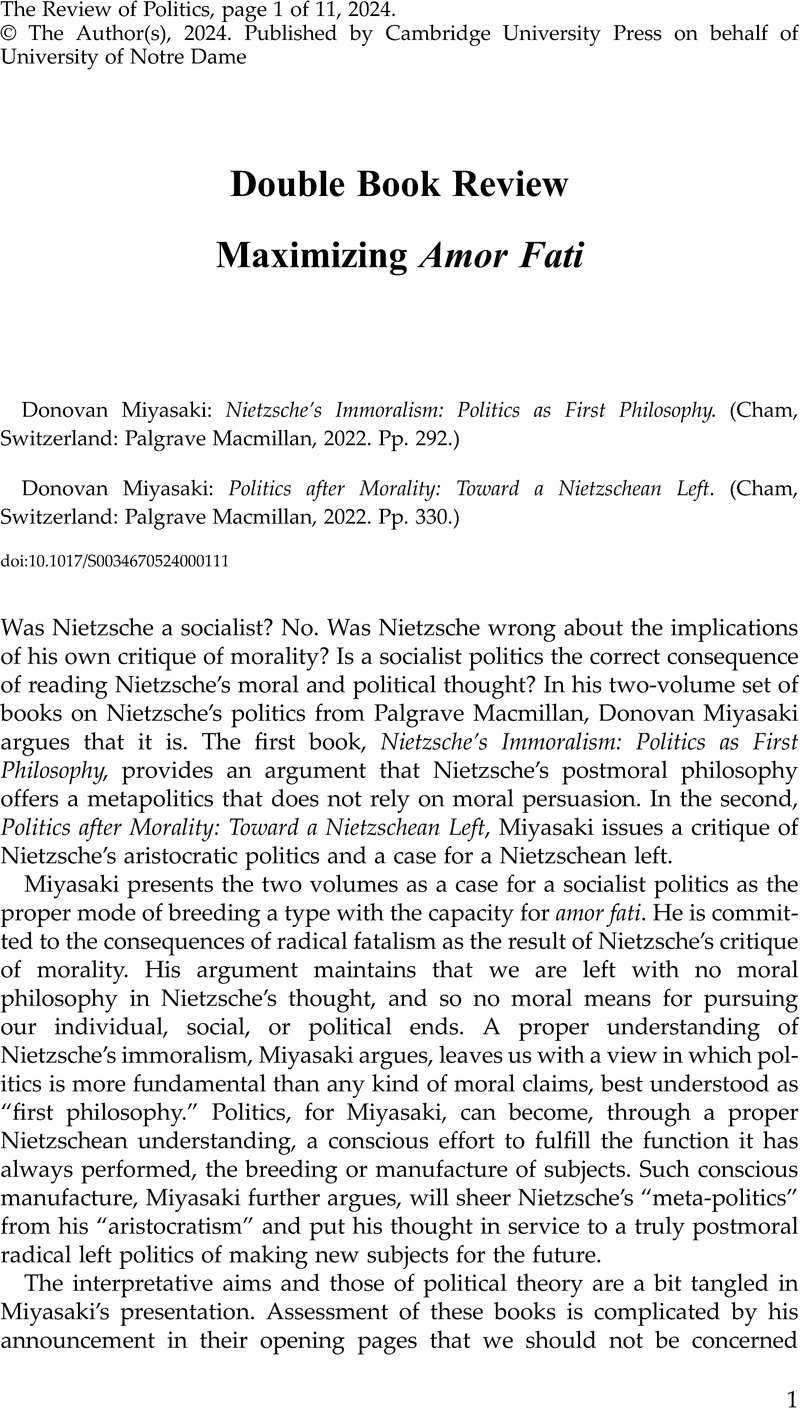No CrossRef data available.
Published online by Cambridge University Press: 19 April 2024

1 Warren, Mark, Nietzsche and Political Thought (Cambridge, MA: MIT Press, 1988)Google Scholar.
2 Owen, David, Nietzsche, Politics, Modernity (New York: Sage, 1995)Google Scholar; Hatab, Lawrence, A Nietzschean Defense of Democracy: An Experiment in Postmodern Politics (Chicago: Open Court, 1995)Google Scholar.
3 Connolly, William, Political Theory and Modernity (New York: Oxford University Press, 1988)Google Scholar; Connolly, Identity/Difference (Ithaca, NY: Cornell University Press, 1991); Honig, Bonnie Political Theory and the Displacement of Politics (Ithaca, NY: Cornell University Press, 1993)Google Scholar.
4 Church, Jeffrey, Nietzsche's Culture of Humanity (New York: Cambridge University Press, 2015)CrossRefGoogle Scholar.
5 Acampora, Christa Davis, Contesting Nietzsche (Chicago: University of Chicago Press, 2013)CrossRefGoogle Scholar; Herman Siemens, “Yes, No, Maybe So. . . Nietzsche's Equivocations on the Relation between Democracy and ‘Grosse Politik,’” in Nietzsche, Power, and Politics, ed. Herman W. Siemens and Vasti Roodt (Berlin: De Gruyter, 2008), 231–68; Hatab, Nietzschean Defense.
6 Franco, Paul, Nietzsche's Enlightenment (Chicago: University of Chicago Press, 2011)CrossRefGoogle Scholar; Meyer, Matthew, Nietzsche's Free Spirit Works: A Dialectical Reading (New York: Cambridge University Press, 2019)CrossRefGoogle Scholar; Abbey, Ruth, Nietzsche's “Human All Too Human” (Edinburgh: Edinburgh University Press, 2020)CrossRefGoogle Scholar; Ansell-Pearson, Keith and Bamford, Rebecca, Nietzsche's Dawn: Philosophy, Ethics, and the Passion for Knowledge (Hoboken, NJ: Wiley, 2021)Google Scholar.
7 Shaw, Tamsin, Nietzsche's Political Skepticism (Princeton, NJ: Princeton University Press, 2007)Google Scholar.
8 Drochon, Hugo, Nietzsche's Great Politics (Princeton, NJ: Princeton University Press, 2016)CrossRefGoogle Scholar.
9 Detwiler, Bruce, Nietzsche and the Politics of Aristocratic Radicalism (Chicago: University of Chicago Press, 1990), 101Google Scholar.
10 Siemens, Herman, “Nietzsche and Productive Resistance,” in Conflict and Contest in Nietzsche's Philosophy, ed. Siemens, Herman and Pearson, James (London: Bloomsbury, 2020)Google Scholar.
11 Katsafanas, Paul, Agency and the Foundations of Ethics: Nietzschean Constitutivism (Oxford: Oxford University Press, 2013)CrossRefGoogle Scholar.
12 Friedrich Nietzsche, “Homer's Contest,” in Prefaces to Unwritten Works, trans. and ed. Michael Grenke (South Bend, IN: St. Augustine's, 2005), 89.
13 Siemens, “Yes, No, Maybe So.”
14 Metzger, Jeffrey, The Rise of Politics and Morality in Nietzsche's “Genealogy” (Lanham, MD: Lexington Books, 2020)Google Scholar; Lawrence Hatab, “Breaking the Contract Theory: The Individual and Law in Nietzsche's Genealogy,” in Nietzsche, Power, and Politics, ed. Herman W. Siemens and Vasti Roodt (Berlin: de Gruyter, 2008).
15 Conway, Daniel, Nietzsche and the Political (New York: Routledge, 1997)Google Scholar; Strong, Tracy B., Friedrich Nietzsche and the Politics of Transfiguration (Urbana: University of Illinois Press, 2000)Google Scholar.
16 Kirkland, Paul E., “Nietzsche's Tragic Realism,” Review of Politics 72, no. 1 (2010): 55–78CrossRefGoogle Scholar; “Nietzsche's Dionysian Realism,” in Edinburgh Companion to Political Realism, ed. Robert Schuett and Miles Hollingworth (Edinburgh: Edinburgh University Press, 2019).